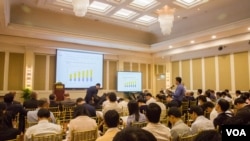Cambodia’s economic health remains strong at about 6 or 7 percent annual growth, but the country needs to harness its young population and invest in training and skills to ensure this trend continues, the World Bank said.
In its most recent economic update, released on Thursday, the Bank said growth had slowed about 6.8 percent last year, slightly down from 7 percent in 2016.
“Growth is projected to remain robust, at 6.9 percent in 2018, underpinned by rising government spending and favorable global conditions, including robust demand in advanced economies,” the report states.
But it added that long-term structural issues such as a lack of skills were likely to lead to a gradual deceleration if the problem is not addressed.
Risks to the outlook remain tilted towards the downside, according to the report. Domestically, risks are associated with a prolonged real estate and construction boom, potential uncertainty related to the July 28 general elections, and declining external competitiveness. Externally, risks are associated with uncertain global trade as protectionism rises. In addition, employment growth prospects look less certain. As real wages rapidly increase, Cambodia's external competitiveness, which primarily relies on cheap labor, is being eroded, the report said. As a result, poverty reduction could slow in the future.
“Growing labor force alone is not sufficient to attract and create jobs. Here, employers particularly face significant skill shortages, so education system and the increase of investment in education has a role to play in filling those gaps. But if some part of the challenges can be addressed, looking at the alternative resources, modernizing education and vocational training, stepping in skill developments provided by the firms are main direction for labor forces to create future jobs,” Inguna Dobraja, the World Bank's country manager in Cambodia, said at the launching of the report.
Meanwhile, the Asian Development Bank predicted late last year that Cambodian growth would slightly increase in 2017 and 2018, to about 7.1 percent, due to positive results in the world’s major economies.
Sok Eysan, ruling Cambodian People’s Party spokesman, said the party was dedicated to improving the skills of the Cambodian workforce.
“This is the vision of the Cambodian government that focuses on human resources, water, roads, electricity,” he said.
“We pay attention to build human resources in line with the new situation and more progress for our country,” he added.




